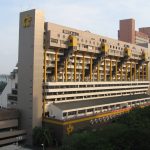In the last year, the price of a luxury property increased by 2.7% on average across the 43 cities tracked said Knight Frank’s 3rd Quarter 2018 Prime Global Cities Index. The research by the leading global real estate services company said that this represents the index’s weakest performance in annual terms for almost six years.
 Luxury property prices in Singapore leads the index with prime prices up 13% over the 12-month period.
Luxury property prices in Singapore leads the index with prime prices up 13% over the 12-month period.
The luxury property prices increase is driven by the limited availability of prime properties and a strong market outlook in the first half of 2018.
The research noted that Hong Kong and Singapore, Asia’s two premier cities, have traded places in the luxury property prices tracking index last year.
“Both cities saw cooling measures introduced over the summer months and, although the rate of annual price growth in Hong Kong has already slowed to 5.5%, Singapore may not be far behind with its quarterly growth weakening to 1.7% in the third quarter of 2018,” said the research.
https://www.icompareloan.com/resources/mortgage-broker-singapore-best-rate/
The same research said Europe’s performance is mixed compared with a year ago. Some European cities are still performing strongly (Edinburgh and Madrid), others have swapped spectacular for steady (Berlin and Paris), whilst for a few, price growth remains in negative territory (London and Dublin).
In London, luxury property prices dipped 2.9% in the last year as uncertainty around Brexit continued.
“This trend has been exacerbated by a growth in supply as more landlords attempted to sell their property following tax changes,” said the research. Adding: “The index’s headline figure of 2.7% growth conceals significant variations both within continents and even within countries.”
“In Canada for example, Toronto (8.5%) continues to see prime prices rise in its exclusive areas of Rosedale and Yorkville. Vancouver (-11.2%), however, sits at the bottom of our rankings as upmarket areas such as West Vancouver have seen a marked slowdown in sales and prices as a result of the raft of measures introduced in February’s Budget.
“This quarter sees the addition of Auckland to our prime index for the first time. Despite a ban on the purchase of existing properties by overseas buyers from 1 July (this excludes new homes) luxury prices increased 8.5% in the year to September 2018. 2018 marks a watershed for the index. The overall narrative of lower growth, which we predicted in 2017, has materialised.”
The rate of growth of luxury property prices has declined for three consecutive quarters and has now reached its lowest rate since Q4 2012, said Knight Frank’s research.
“A combination of uncertainty surrounding Brexit, rising interest rates across major economies, a tighter regulatory environment and the remnants of high supply in some markets is impinging on price growth,” it said.
Singapore’s luxury properties are likely to be hardest hit by the recent property cooling measures, with sales forecast to fall between 30 and 40 percent in the next two quarters, reported Bloomberg in August. In quoting Christine Li, a senior director and head of research for Singapore at Cushman & Wakefield Inc, the report suggested that foreigners may hesitate with their purchase of luxury homes considering the 20 percent stamp duties they would now be subjected to.
Overseas buyers accounted for one-third of luxury homes deals closed in Singapore last year. “More foreign buyers have been eyeing Singapore’s luxury homes for the past year, but they may now take a back seat,” said Li.
https://www.icompareloan.com/resources/singapore-banks-transferring-interest-volatility-risks-consumers/
Buyers from China especially have positioned themselves as the top foreign property buyers and investor group in Singapore over the past five years, while Malaysians and Indonesians came in at second and third place respectively. Properties located in the north-east and central regions of Singapore saw the highest level of demand last year from foreigners and Singapore permanent residents.
Before the new property cooling measures, foreign property buyers viewed the Singapore market as a more affordable option for real estate investments, especially when compared to other major global cities, They had however been deterred in previous years by property cooling measures such as the Additional Buyer Stamp Duty (ABSD) of 15 per cent imposed on foreigners investing in Singapore properties.
Only 5.6 per cent of the total number of transactions last year were concluded by foreign property buyers versus a long-term 18-year average of 8.7 per cent. But with countries (and jurisdictions) like Taiwan, Hong Kong, Canada and Australia increasing their transaction costs for foreigners looking to acquire property in their countries in recent years, the Singapore real estate market begin shining once again.
But with the recent hike of the Additional Buyer’s Stamp Duty (ABSD) from 15 to 20 percent on foreign property seekers and from 15 percent to 25 percent on entity buyers, the luxury property market has especially felt the brunt of the Government’s property cooling measures as it is highly dependent on demand by foreigners.
How to Secure a Home Loan Quickly
Are you planning to purchase a luxury property but ensure of funds availability for purchase? Don’t worry because iCompareLoan mortgage brokers can set you up on a path that can get you a home loan in a quick and seamless manner.
Our brokers have close links with the best lenders in town and can help you compare Singapore home loans and settle for a package that best suits your home purchase needs. Find out money saving tips here.
Whether you are looking for a new home loan or to refinance, our Mortgage brokers can help you get everything right from calculating mortgage repayment, comparing interest rates all through to securing the best home loans in Singapore. And the good thing is that all our services are free of charge. So it’s all worth it to secure a loan through us.
For advice on a new home loan.
For refinancing advice.







